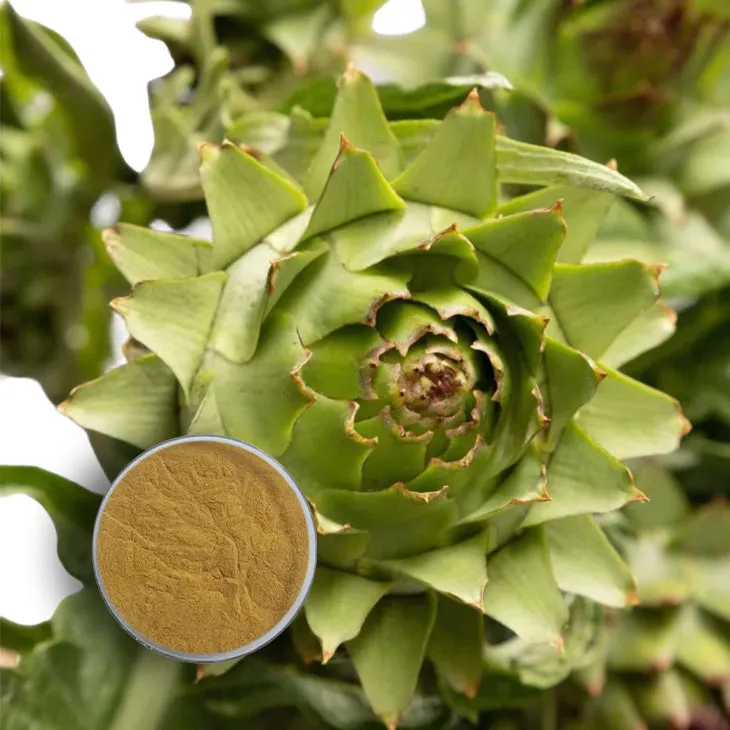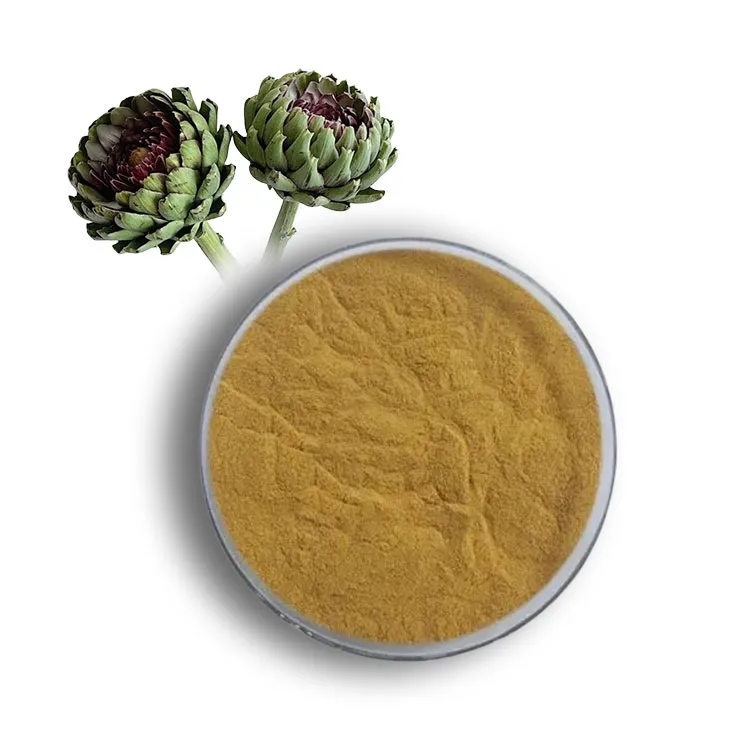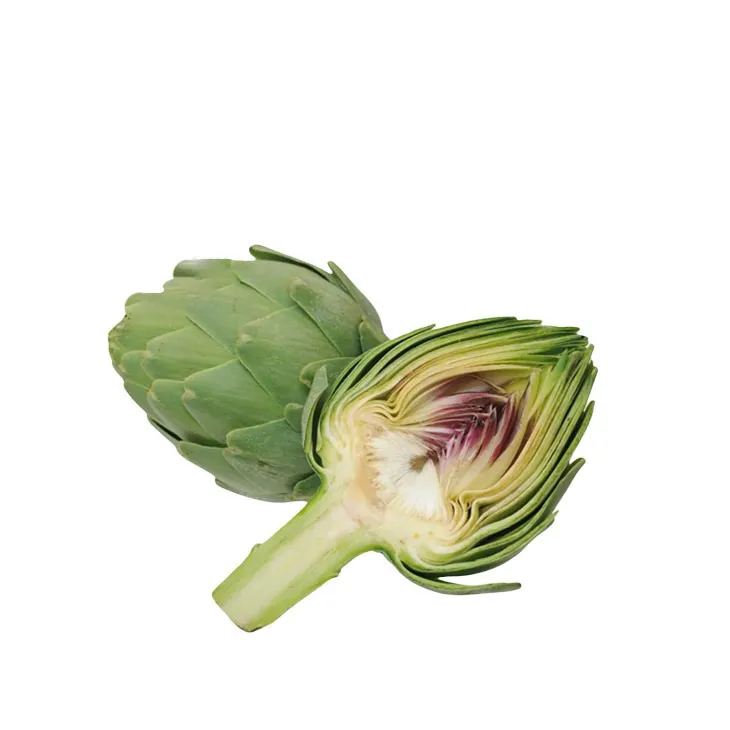- 0086-571-85302990
- sales@greenskybio.com
Best Answers to 7 Key Questions about Artichoke Leaf Extract
2024-12-12

1. What is Artichoke Leaf Extract?
Artichoke Leaf Extract is a natural product derived from the leaves of the artichoke plant (Cynara scolymus). The artichoke is a thistle - like plant that has been cultivated for centuries, both for its edible parts (the heart and the bottom of the leaves) and for its potential medicinal properties. The extract is obtained through various methods, typically involving drying and grinding the leaves followed by extraction using solvents or other techniques to isolate the active compounds.

2. What are the Main Active Compounds in Artichoke Leaf Extract?
There are several important active compounds in artichoke leaf extract:
- Cynarin: This is one of the most well - known compounds. It has been studied for its potential effects on digestion, liver function, and cholesterol levels.
- Chlorogenic acid: Which is also found in other plants such as coffee. It has antioxidant properties and may play a role in reducing inflammation and protecting cells from oxidative damage.
- Flavonoids: These are a group of compounds that contribute to the antioxidant and anti - inflammatory effects of the extract. They can also have potential benefits for cardiovascular health.

3. What are the Health Benefits of Artichoke Leaf Extract?
Artichoke leaf extract offers a range of potential health benefits:
-
Digestive Health
- It can stimulate bile production in the liver, which is important for the digestion and absorption of fats. This may help relieve symptoms of indigestion, such as bloating, flatulence, and abdominal discomfort.
- May also have a prebiotic - like effect, promoting the growth of beneficial gut bacteria.
-
Liver Health
- By promoting bile flow, it can help the liver in its detoxification processes. It may also protect the liver from damage caused by toxins or certain medications.
- Some studies suggest that it can improve liver function markers in patients with liver diseases, although more research is needed.
-
Cholesterol Management
- There is evidence that artichoke leaf extract may help lower LDL ( "bad" ) cholesterol levels. The cynarin in the extract may interfere with cholesterol synthesis in the body or enhance its excretion.
- It may also have a positive impact on the ratio of HDL ( "good" ) to LDL cholesterol.
-
Antioxidant and Anti - Inflammatory Effects
- The presence of chlorogenic acid and flavonoids gives the extract antioxidant properties. These antioxidants can scavenge free radicals in the body, reducing oxidative stress.
- The anti - inflammatory effects may be beneficial for various conditions, such as arthritis or other inflammatory diseases.
-
Cardiovascular Health
- Due to its potential to lower cholesterol and its antioxidant and anti - inflammatory effects, artichoke leaf extract may contribute to better cardiovascular health. It may help reduce the risk of heart disease by improving blood lipid profiles and reducing inflammation in the blood vessels.

4. How is Artichoke Leaf Extract Used?
Artichoke leaf extract can be used in several ways:
-
Supplements
- It is available in the form of capsules, tablets, or liquid extracts. These supplements are often standardized to contain a certain percentage of active compounds, such as cynarin.
- When taking supplements, it is important to follow the recommended dosage instructions provided by the manufacturer or a healthcare professional.
-
Herbal Teas
- Dried artichoke leaves can be used to make herbal teas. To make the tea, steep the dried leaves in hot water for about 5 - 10 minutes. This can be a pleasant and natural way to consume the extract, although the concentration of active compounds may be lower compared to supplements.
-
Culinary Use
- While the extract is not typically used directly in cooking in the same way as other spices, the artichoke itself is a popular ingredient in many cuisines. Eating artichokes regularly may provide some of the benefits associated with the leaf extract in a more natural and whole - food form.
5. Are There any Side Effects or Precautions?
Although artichoke leaf extract is generally considered safe for most people, there are some considerations:
-
Allergic Reactions
- Some individuals may be allergic to artichokes. Symptoms of an allergic reaction can include skin rashes, itching, swelling, or difficulty breathing. If you have a known allergy to artichokes, you should avoid artichoke leaf extract.
-
Digestive Upset
- In some cases, especially when taking high doses, artichoke leaf extract may cause digestive upset, such as nausea, diarrhea, or abdominal cramps. Starting with a low dose and gradually increasing it can help minimize these side effects.
-
Drug Interactions
- Artichoke leaf extract may interact with certain medications. For example, it may enhance the effects of drugs that lower blood sugar, so it should be used with caution in people with diabetes who are taking such medications. It may also interact with medications metabolized by the liver, so it is important to consult a healthcare provider if you are taking any medications.
6. How Much Artichoke Leaf Extract Should be Taken?
The appropriate dosage of artichoke leaf extract can vary depending on several factors, including the form of the extract (capsules, tablets, liquid), the intended use (e.g., for general health or for a specific condition), and individual factors such as age, weight, and overall health.
-
For Supplements
- Typical dosages for artichoke leaf extract supplements range from 300 - 1, 500 mg per day. However, it is always best to follow the recommended dosage on the product label or as advised by a healthcare professional.
-
For Herbal Teas
- Since the concentration of active compounds in herbal teas can vary widely, it is difficult to recommend a specific dosage. However, drinking 1 - 3 cups of artichoke leaf tea per day is a common approach.
7. Where Can You Get Artichoke Leaf Extract?
Artichoke leaf extract can be obtained from several sources:
-
Health Food Stores
- Many health food stores carry artichoke leaf extract in the form of supplements. These stores often have a variety of brands and formulations to choose from, and the staff may be able to provide some basic information about the products.
-
Online Retailers
- There are numerous online retailers that sell artichoke leaf extract supplements. When purchasing from online sources, it is important to choose a reputable seller to ensure the quality and authenticity of the product. Look for reviews and check for certifications or third - party testing.
-
Some Pharmacies
- In some cases, pharmacies may also stock artichoke leaf extract supplements, especially those that focus on natural or herbal remedies.
FAQ:
Question 1: What is artichoke leaf extract?
Artichoke leaf extract is a substance derived from the leaves of the artichoke plant. It contains various bioactive compounds such as cynarin, which is thought to have several potential health - promoting properties.
Question 2: What are the potential health benefits of artichoke leaf extract?
It may offer benefits for digestive health. For example, it could help with indigestion, bloating, and improving bile flow. There are also indications that it may have antioxidant properties, which can help combat oxidative stress in the body and potentially contribute to overall health and well - being.
Question 3: How is artichoke leaf extract used?
It can be used in supplement form. Typically, it is available in capsules or tablets. Some people may also use artichoke - based products, like teas or tinctures, which also contain artichoke leaf extract.
Question 4: Are there any side effects of artichoke leaf extract?
While generally considered safe for most people, some individuals may experience mild side effects such as an upset stomach, diarrhea, or allergic reactions. It's important to consult a healthcare provider before starting to use it, especially if you have pre - existing health conditions or are taking other medications.
Question 5: Can artichoke leaf extract interact with medications?
Yes, it may interact with certain medications. For example, it could potentially interact with drugs that affect the liver's metabolism. So, it's crucial to inform your doctor if you are planning to take artichoke leaf extract while on other medications.
Related literature
- The Health Benefits of Artichoke Leaf Extract: A Comprehensive Review"
- "Artichoke Leaf Extract: Composition, Properties and Therapeutic Applications"
- "Interaction of Artichoke Leaf Extract with Medications: An Overview"
- ▶ Hesperidin
- ▶ citrus bioflavonoids
- ▶ plant extract
- ▶ lycopene
- ▶ Diosmin
- ▶ Grape seed extract
- ▶ Sea buckthorn Juice Powder
- ▶ Beetroot powder
- ▶ Hops Extract
- ▶ Artichoke Extract
- ▶ Reishi mushroom extract
- ▶ Astaxanthin
- ▶ Green Tea Extract
- ▶ Curcumin Extract
- ▶ Horse Chestnut Extract
- ▶ Other Problems
- ▶ Boswellia Serrata Extract
- ▶ Resveratrol Extract
- ▶ Marigold Extract
- ▶ Grape Leaf Extract
- ▶ blog3
- ▶ blog4
- ▶ blog5
-
Pure 85% Tomentil Extract.
2024-12-12
-
Yohimbine Bark Extract
2024-12-12
-
Purple Sweet Potato Extract
2024-12-12
-
Senna Leaf Extract
2024-12-12
-
Stevia Extract
2024-12-12
-
Citrus bioflavonoids
2024-12-12
-
Genistein
2024-12-12
-
Mulberry leaf Extract
2024-12-12
-
Yellow Pine Extract
2024-12-12
-
Ginseng Root Extract
2024-12-12
-
Hericium erinaceus extract powder
2024-12-12





















